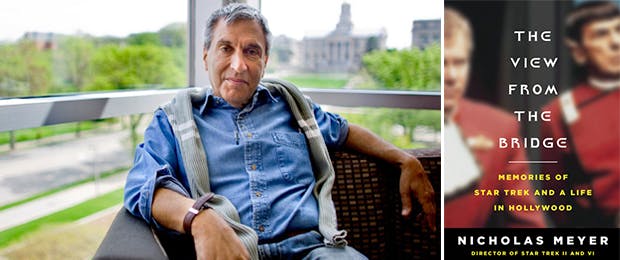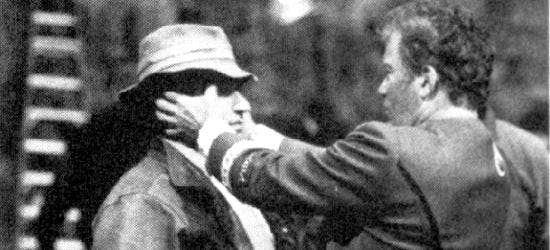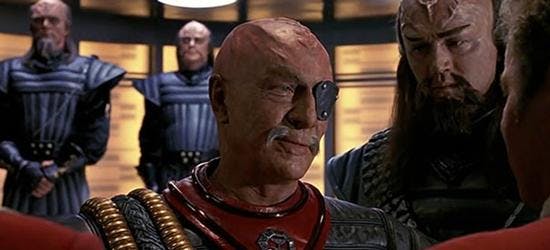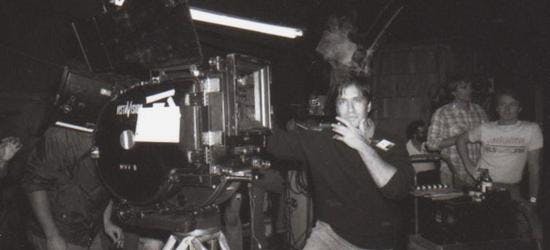Published Sep 27, 2014
EXCLUSIVE INTERVIEW: Part III, Nicholas Meyer on Today's Trek
EXCLUSIVE INTERVIEW: Part III, Nicholas Meyer on Today's Trek

Star Trek is warping fast toward its 50th anniversary, and there are several behind-the-scenes figures without whom it wouldn’t be possible: Gene Roddenberry, Gene Coon, Harve Bennett, Rick Berman, Nicholas Meyer, Dorothy Fontana, Robert Justman and, yes, J.J. Abrams. Of those still alive, StarTrek.com has interviewed Bennett, Berman, Fontana and Abrams, but Meyer had eluded our grasp… until now. Meyer directed (and co-wrote, uncredited) Star Trek II: The Wrath of Khan, co-wrote Star Trek IV: The Voyage Home and co-wrote and directed Star Trek VI: The Undiscovered Country. He’d done plenty of strong work before hooking up with Trek (The Seven Percent Solution, Time After Time), did more in between Treks (The Day After) and has done even more since (Sommersby, The Odyssey, Elegy and Houdini), but most people, when they think of Meyer, associate him with Star Trek. In fact, he titled his memoir, “The View From the Bridge: Memories of Star Trek and a Life in Hollywood."
The writer-director-author will make a rare convention appearance next week when he takes the stage at Destination Star Trek 3 in London, and that upcoming event provided us with the long-awaited opportunity to speak with Meyer. Meyer talked frankly about his contributions to Star Trek, and he did so in detail, addressing so much ground that we've running this interview over the course of three days. Below is the final installment. Read part one and read part two here.

Just to clarify something, you mentioned that you were asked to direct Star Trek V. Wasn’t that William Shatner’s to direct because of his favored nations clause, which basically meant that if Leonard Nimoy directed one, he got to do one, too?
MEYER: I have no idea. But I do know that I was… I don't think I was ever offered to write it, but I think I was offered to direct it at a certain point.
You have in the recent past discussed your regrets about your relationship with Gene Roddenberry during the making of VI. But, what was your relationship before that, back when you did II and IV?
MEYER: I don’t recall meeting him at all on IV. As I say, that was so fast. And it was just about Harve and Leonard and me, and to some extent Ned Tanen and Dawn Steel. I don't think I crossed paths with Roddenberry at all. It’s interesting that memory plays tricks, because years ago, I was asked this question about, “What did I know about Gene Roddenberry from Star Trek II?” I said, “Gee, I – you know, I think I met him, and that was it.” But my papers are at the University of Iowa Library, in Iowa City. I was back there, and they showed me an exhibition. I was completely flabbergasted to find a lengthy correspondence between me and Gene Roddenberry, who I guess didn’t like The Wrath of Khan -- well, it was then called The Undiscovered Country. He didn’t like that script any better than he liked the script for Star Trek VI. But the exchange of letters at least shows that I was trying to be more accommodating and tactful, and – more calmly argumentative than I was on VI -- when I just didn’t behave well. I was just… had too much on my plate, I guess.
Star Trek obviously continued on with Next Gen, Deep Space Nine,Voyager and Enterprise. Did you ever tune into any of those shows, or no?
MEYER: No. The only time I… I was always frightened to see any of the other movies because, with my insecurities, I just thought I would think they were all better than mine, and I’d get very depressed. So, it wasn’t until – I don't know, three or four years ago, that somebody said, “We’d like to do a special segment on a DVD of Star Trek villains. And, would you be part of that?” I said, “Okay.” Then I realized I’d have to look at all the subsequent features in order to see all the villains. So I did. I can't remember them very well, but, I do remember thinking that… initially, I was totally flabbergasted by all the money that the other people got to spend and all the special effects and things I hadn't had at my disposal. I was always playing with leftovers. Star Trek: The Motion Picture was $45 million in 1979, and Star Trek II was, I think, $11.2 million. Star Trek V was about 30 million bucks, and ultimately Star Trek VI was exactly the same price. Whereas typically, every Star Trek movie was 41 percent more expensive than its predecessor. So, I was always being shortchanged in the budget, costume, everything department, and I was deeply envious of these features that had all these toys to play with. But when I sort of got over that, I felt pretty content, I guess, with my own contributions to the series. And I do remember thinking, or addressing the question about, “Who is – which is the greatest Star Trek villain,” and I finally decided that the greatest Star Trek villain was in IV...
Please finish the thought.
MEYER: What do you think of my thought?
QUESTION: The villain in IV was us. Humanity is screwing it up for themselves.
MEYER: A-ha! A-ha! Man. Man is the villain.

Speaking of villains, Christopher Plummer was a brilliant villain in VI…
MEYER: Well, that was a dream come true. I had always been a fanatic Christopher Plummer fan. I still am. I had acquired a CD of him performing excerpts from Henry V to the accompaniment of the musical score that William Walton wrote for the Olivier movie of Henry V. I used to just listen to it over and over and over again. And Chang came out of that recording. I just thought, “I want a Shakespeare-quoting guy, and we’re gonna get Christopher Plummer.” It’s the only time I ever wrote specifically for an actor, not counting the Star Trek cast. And I said to Mary Jo Slater, who was our casting director, “You have to get him for this, because I can't make the movie otherwise. There’s no other actor who can do this.” So, she got him. And I had the time of my life. It was just my own Shakespeare wind-up toy. I would just say, “Do that ‘Let slip the dogs of war’ for me again.” He was a delight.
Switching gears…. What do you remember of attending J.J. Abrams’ Bar Mitzvah?
MEYER: You know, I don't remember a blessed thing, except the fact that I was there. And it wasn’t until J.J. bumped into me in the Fox commissary and said, “Do you remember what you gave me for my Bar Mitzvah?” I said, “No.” He said, “You gave me The Annotated Sherlock Holmes. And my son is now reading it.” I thought, “Well, that’s cool.” I was happy with that. I was pleased with that.
Did you see his Trek films? What’d you make of them?
MEYER: Well, they’re very different. They’re very different. I think when I respond to them I sound like kind of an old fogey, because I know they… People say, “Well, not your grandfather’s Star Trek.” There’s no question as to J.J.’s expertise as a filmmaker. Jesus, he’s fantastic. But I think our understanding of the material is so different. It’s just… I have nothing but respect for what he does. But it’s so different from… I don't see Spock as a guy that goes around slugging people and just sort of hitting them again and again and again. None of these people seem to be the same characters that I was asked to deal with. I know what II is about. II is about friendship, old age and death. I know what IV is about. It’s about extinction. It’s about taking care, ecologically, of the only home that we have. I understand what VI is about. It’s about the collapse of the Soviet Union, and it’s about change and fear of change and “Have we reached the end of history?” as Francis Fukuyama wrote when the wall came down. Those are the themes and the ideas of those three movies on which I worked. I don't know what the ideas are in the new Star Trek movies. I understand that they’re rebooting them, but that’s a mechanical chore, that’s a technical chore. I don't understand what they’re about. Does that make sense?
You wrote your memoir in 2009. What did it mean to you, A, to get it all down on paper? And B, how pleased were you by the reaction to the book?
MEYER: Well, I’m very pleased by the reaction to the book. I’m sort of kicking myself, because I knew the only reason the book would be published was if I hung a Star Trek moniker on it, and people would think it would be about making all these Star Trek movies. That’s how I got it published, but originally, there was a lot more material on other subjects. My publishers kept sort of blitzing me to cut it down and cut it down and cut it down. It turned out that to some extent, my instincts were better than theirs because a lot of people who enjoy the book have been kind enough to say that they were particularly fascinated by the parts of the book that had nothing to do with Star Trek. So, I wished I’d included more of them.
QUESTION: Well, what that leads to is book two, right?
MEYER (laughs): Yeah, if I have five minutes. I mean, I wrote that when the Writer’s Guild was on strike. That’s when I tend to write books. And at the moment, I’m just busy.

Last question. If you were making the Star Trek films today, how do you think you'd contend with all of the Internet intrusions? People prying the way they can now? Abrams basically put a cloak over his Trek productions. He had people driven to set in covered golf carts to hide to them and people wrapped in blankets to hide their costumes. You got a couple of letters because people were upset about rumors that Spock might die. It’s a different world.
MEYER: It surely is a different world. He had people covered in blankets? Huh. Wow. Wow. You know, I like him so very much that I’m appalled that he has to contend with that. I don't know what to make of that. But, I guess most of the movies that I’m interested in making, nobody would go to all that trouble about.
Visit www.destinationstartrek.com for details about Destination Star Trek 3.

